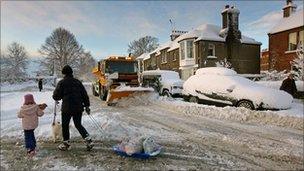Getting the message across on school closures
- Published

Some parents have been left unsure whether to take their children to school or not
Children across Scotland have been enjoying an extended weekend as schools close because of the wintry weather.
But the joy of youngsters freed from class is often not echoed by their parents, who may have to arrange childcare at short notice or take the day off themselves.
And juggling the morning routine becomes even harder when it's not clear if your child's school is shut or not.
At about 0700 GMT on Thursday, as thousands of parents in Glasgow were attempting to discover if the city's schools were opening that morning, the Glasgow City Council website went down.
A message on the council's Twitter feed, external said schools were "likely" to open, but only pointed parents back to the main site, which was largely unreachable for the next two hours.
Glasgow council's servers were not the only ones to buckle under the pressure of thousands of people searching for information on how the weather was affecting schools, roads and many other services.
Stirling Council was forced to set up a temporary Wordpress blog when its own site went down.
Highlands Council also lost its website for a time and problems were reported with East Ayrshire, Moray and both the Lanarkshire council websites.
It's a common enough problem, said business continuity expert Gareth Howell, who believes websites that communicate emergency information should be frequently subjected to "extreme" testing.
"There is a growing trend where the first reaction of the public to an emergency is to visit the web - assuming they can of course," he said.
"Thus it is vital that council websites are able to cope with emergency workloads."
Father-of-two and technology entrepreneur Steven Livingstone-Perez told BBC Scotland he was pleased to see Glasgow City Council using the web to communicate - but said the authority needed to make its site more robust.
He said it got "chaotic" for parents unsure whether schools were opening or not.
"At busy times - especially on Thursday where the BBC said 'some schools may be closed, check the Glasgow gov site' - the site slowed down, or just didn't work.
"However, my real gripe is the messaging part. I wonder how much it cost them in communications and last minute phone calls to as many parents as they could manage?
"This at a time where every parent has at least one of SMS, Facebook, Twitter or e-mail. Every school should make it a core part of their communications drive to get these details from every parent in the school."
Craig McGill, managing director of social media company Contently Managed, also thinks councils have a long way to go before perfecting their online communication strategies.
But he said their increasing use of social networking sites does give them a back-up if their own sites go down - and a way of communicating on a platform that many people now use naturally in their everyday routine.
A BBC Scotland survey found that about two-thirds of Scotland's 32 local authorities were using Twitter, Facebook or blogs to supplement their own website.
Mr McGill said: "Facebook and Twitter - these tools are mainstream now. Especially with the rise of mobile, many more people use these services.
"It's not about the technology being revolutionary, it's about what people are using."

Many councils are starting to use tools like Twitter and Facebook
But Mr McGill, who said he had struggled at times to find out information about his daughter's school from the North Lanarkshire Council website, said councils also needed to engage with people on sites like Twitter, rather than simply "broadcast" messages.
"That's how people use these platforms," he said.
"If global brands can communicate via twitter, why can't councils? All people want is information."
He added that many councils did not appear to be monitoring replies to them on Twitter or Facebook, which left people feeling "frustrated" and council staff downhearted at the abuse being thrown their way.
But some authorities have received a positive response to their use of social networking to communicate emergency messages.
Orkney Islands Council says it has been encouraging Orcadians to sign up to its Facebook page, external since October, in preparation for the winter.
The authority also posts information on BBC Radio Orkney's Facebook page, external, which has about 4,000 followers.
A council spokeswoman said: "Last year we piloted using Twitter to get information about school closures out. But we found it did not give enough space for all the details."
This year, the council is using Twitter as an alert system to point people to Facebook or the authority's own site, she said.
And the council said many people had also set up their Twitter accounts so they would be sent a text message as soon as the council posted something.
"A lot of folk are already using it and people want to engage with it," she added.
"We're piloting it at the moment, but it seems to be working."
- Published2 December 2010
- Published2 December 2010
- Published21 December 2010
- Published2 December 2010